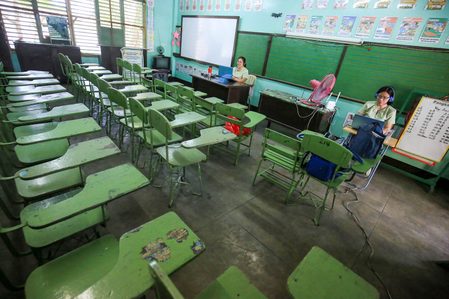SUMMARY
This is AI generated summarization, which may have errors. For context, always refer to the full article.
![[OPINION] Moving beyond blaming teachers: The call for regulatory deregulation](https://www.rappler.com/tachyon/2024/02/Moving-Beyond-Blaming-Teachers-The-Call-for-Regulatory-Deregulation.jpg)
The discouraging results of the PISA assessments and the alarming findings of the EDCOM II report concerning the condition of Philippine education underscore a crucial point: there are far more pressing matters to address than the ongoing verbal sparring between the former and current presidents of the country.
Undoubtedly, teachers will inevitably come under scrutiny, as much of the issue may be attributed to the quality of teaching. However, the quality of teachers is contingent upon the caliber of teacher education institutions responsible for producing graduates who will join the educational system as teachers.
In its first report for the year 2023, the 2nd Philippine Congressional Commission on Education (EDCOM II) highlighted, among various considerations, the imperative of harmonizing policies and programs across key educational bodies. Specifically, the report underscores the necessity of synergy among critical stakeholders responsible for regulating and shaping teacher education in the country. These stakeholders include the Commission on Higher Education (CHED), which establishes the minimum requirements for teacher education institutions offering programs; the Professional Regulation Commission (PRC), tasked with overseeing the licensing of teachers teaching at the elementary and secondary levels; and the Department of Education, the largest employer of teachers.
Examining the performance in licensure examinations, the Professional Regulation Commission has noted a concerning trend, stating that the passing rates of the Board Licensure Examination for Professional Teachers (BLEPT) are consistently lower compared to other professional board examinations. Over the period from 2010 to 2022, individuals taking the Bachelor of Elementary Education (BEEd) consistently achieved the lowest passing rates among all professional board examinations, with only around one-third of takers successfully passing the exams. Simultaneously, those taking the Bachelor of Secondary Education (BSEd) fared slightly better, yet the data still indicates that less than half of the candidates demonstrated the requisite qualifications to become teachers (Philippine Business for Education, 2023, p. 10). This concerning pattern raises critical questions about the efficacy of teacher education programs and the readiness of graduates entering the teaching profession.
Are Teacher Education Institutions (TEIs) effectively equipping future educators with the necessary skills for the demands of the basic education system? Or is the Department of Education, instead of receiving well-prepared teachers, consistently faced with the challenge of re-training a continuous influx of ill-prepared teachers to meet basic requirements? Despite the Department of Education’s ongoing teacher development initiatives, such programs operate more as corrective measures when TEIs persist in producing graduates who fall short of the required competence. This prompts the crucial question: What preventive measures are in place to break this recurring cycle and ensure a stream of adequately prepared educators from TEIs?
While Teacher Education Institutions (TEIs) may bear some accountability for the issue of ill-prepared teachers, regulators must also assess their role. After all, teacher education functions as one interconnected ecosystem. Take, for instance, the Commission on Higher Education (CHED), which has delineated the Policies, Standards, and Guidelines (PSG) for Bachelor in Elementary Education (BEEd), Bachelor of Secondary Education (BSEd), and Bachelor in Early Childhood Education (BECEd) through Memorandum Circulars No. 74, 75, and 76 respectively. Despite ongoing reforms by the Department of Education aimed at enhancing Teacher Quality and the basic education curriculum, CHED has yet to conduct a comprehensive review or revision of its PSGs issued in 2017.
It’s crucial to recognize that the transformative impact of the pandemic, which began in 2020, has accelerated changes in learning delivery methods. This underscores the urgent need to overhaul the teacher education curriculum, aligning it with contemporary needs, and integrating technology effectively. Meanwhile, the Profession Regulation Commission (PRC) is responsible for licensing elementary and secondary level teachers. However, there is a gap as there is no licensing examination for early grades teachers. This gap persists because RA 7836, enacted in 1994, which prescribes licensure examinations for teachers, has not been reviewed and updated to align with the reforms instituted by the Department of Education.
Regulatory policies, by their nature, require time to adapt, which can potentially impede the agility of Teacher Education Institutions (TEIs) to respond promptly and effectively. Given the imperative for a radical shift in the education ecosystem, the regulatory framework must pivot towards incentivizing high-performing TEIs to innovate, enabling them to adjust their programs without being constrained by compliance requirements. After all, quality should stand as the sole criterion.
To ensure that education systems are adequately prepared for the future, fostering an innovation mindset is paramount. Rather than solely emphasizing compliance, our regulators should actively promote and support innovation within the education sector. This requires a shift towards deregulation, allowing for greater flexibility and creativity in educational practices and policies. – Rappler.com
Dr. Feliece I. Yeban is a teacher-educator and professor of Human Rights Education at the Philippine Normal University. She is one of the recipients of the 2023 UP President Edgardo J. Angara Fellowship researching on education access as one of the priority areas of the 2nd Philippine Commission on Education (EDCOM II).
1 comment
How does this make you feel?







![[OPINYON] Tungkol sa naging viral na social media conjecture](https://www.rappler.com/tachyon/2024/07/thought-leaders-conjecture-07262024.jpg?resize=257%2C257&crop_strategy=attention)




![[OPINION] How can teachers develop a reading habit among learners?](https://www.rappler.com/tachyon/2024/07/imho-reading-habit.jpg?resize=257%2C257&crop_strategy=attention)



The ideas of FELIECE YEBAN in her article are very significant. They promote “a shift towards deregulation, allowing for greater flexibility and creativity in educational practices and policies.” But I believe these will be affected by the attitude of both President Marcos Jr. and Vice-President and concurrent DepEd Secretary Sara Duterte. This is because they are pro-regulation and perhaps even greater regulation. Secondly and lastly, “greater flexibility and creativity in educational practices and policies” is proper as long as they do not involve critical thinking in the social sciences.